Share

Invisible Not Broken - Chronic Illness Podcast Network
Diagnosed 15 years too late: Stephanie Tait and the View From Rock Bottom (Part 1)
Website: stephanietaitwrites.com
--> Her interview on The Today Show
What is your illness(es)?
-I had Lyme disease and other co-infections for 15 years before they got it correctly diagnosed. As a result I have permanent heart damage, permanent neurological damage (causing a variety of symptoms including an intermittent tremor, neuropathy, balance issues, aphasia, memory problems, chronic fatigue, anxiety, and more,) epilepsy, arthritis, and a variety of immune dysfunctions.
-I also have Complex Post Traumatic Stress Disorder (C-PTSD) stemming from childhood trauma but exacerbated by some additional trauma I experienced later in life.
How did your illness shape your career?
- I am an author and speaker. Earlier this year I released my first book, The View From Rock Bottom, in which I advocated for a deeper and more robust Christian theology of suffering, grief, and lament.
In essence, my career sprung directly out of my illness. I tried for many years to hold down a number of “traditional jobs” as people would think of them, but every time I ended up either let go or I had to quit - because my health would make it all but impossible to show up consistently and keep up with my work. Eventually my health got to the point where I spent a lot of time effectively bedridden, which was really difficult for a super extroverted personality like me. I started relying on social media as a tool to connect with the outside world and to seek relationship with others. I’m a natural over-sharer, so I would end up sharing a lot of details of what was happening with both my health and with the financial struggles that my healthcare costs (and inability to work) created. I never really set out to “grow a platform” as people call it, it just sort of happened organically out of my attempts to share my stories and connect with people while stuck in bed. Eventually I started a lifestyle blog, because that was one of the clearest avenues at the time for a woman with a social media following to try to monetize that platform and support themselves. But after a couple of years it became pretty apparent to me that I didn’t want to have to keep playing the blogger game, in terms of generating Pinterest worthy content to supplement the important writing. I started pitching more freelance articles to more serious outlets, and took a number of jobs as a public speaker. An attendee at one of those speaking jobs ended up being the connection that introduced me to a publisher, and ultimately led to my book deal.
- Ironically though, as much as my career sprang directly out of my illnesses, it is those same illnesses that have been the biggest catalyst to growth in that same career. My body already struggles with the small amount of travel I do right now, it make it hard to book a lot of better speaking jobs in other locations. My neurological problems can make it hard for me to write on many days, so my work schedule can be super unpredictable and I often find myself overwhelmed with how behind I feel. Because of my immune dysfunctions, I get sick constantly, especially in the winter, which provides additional challenges as well. I have so many big goals and ideas and ways I’d like to grow my career, but the two biggest challenges to that are my health, and the financial difficulties created by the enormous cost of my healthcare.
What makes your mission as an “influencer” unique?
- I’m an open book, with virtually no division between my public and private life, which makes me a pretty big anomaly not just in the world of internet personas, but more specifically in the Christian author/speaker world. For Christian women especially, there is a particular “type” of woman you generally see writing and speaking, and I’m pretty far from the stereotype in just about every way. I’m politically liberal, I share candidly about my struggles (whether that be my physical health, my mental health, our finances, or whatever they may be,) and I lack the polish and branding you would usually expect. I don’t have a clearly defined “niche” with my work, and have resisted any attempt to streamline myself into one specific label at the expense of other areas I want to speak into. I get into trouble a lot because I’m unwilling to edit myself or my stories to make audiences more comfortable or to make myself more appealing to the market. But I think that’s exactly what people respond to most in my work: so many of us are tired of the branded and inauthentic world of influencers and “thought leaders,” and we’re craving something different. Something shockingly real. Something we can relate to.
What’s your latest project/post/feature that you are most excited about?
My book just came out back at the beginning of August, and I’m really REALLY proud of the work I did there. That book was essentially 3 years worth of work, sweat, and tears (SO many tears,) and it’s been amazing to see the responses I’m getting from readers, and the conversations the book has inspired.
What are you most passionate about in regard to your work/helping people?
- I want people to learn how to show up completely for their lives RIGHT NOW TODAY, and not wait for “someday when.” Too much of our lives are wasted on the “someday when” lie. “Someday when” I get better, “someday when” I’m out of debt, “someday when” I have a spouse or kids or that career goal or I can buy a house or whatever the arbitrary line of “then I’ll have arrived” looks like for us - THEN I can allow myself to do all these things I want to do. THEN I can let myself have more than bare minimum survival. THEN I can be happy. Except “someday when” is a lie. Sometimes those goals will never happen for us. Sometimes they work out, but we are surprised to find a new “someday when” pop up in its place. And in the end, we lose years of our lives chasing the “someday when,” instead of allowing ourselves enjoyment today.
How do/did you handle flares while working?
-Poorly? (lol) But seriously though, I’m the worst. I have a downright predictable tendency to dramatically overdo it the *second* I have a little bit of energy, and then find myself paying for it for days or weeks afterwards. One of the things I’ve learned in trauma therapy is that for many of us with chronic illnesses and/or disability, we tend to disconnect ourselves from our body’s signals as a survival mechanism. In order to keep up with even the bare minimum demands of life, we often have to train ourselves to ignore our body’s signals of pain, fatigue, etc. The problem is that the more we disconnect from those signals, the more difficult it can be to register ANY of our body’s cues. The biggest component of trauma therapy for me has been learning tools for better embodiment, trying to connect my cognizant brain back to my physical body, so I can pursue a healthier sense of wholeness. I’m still learning, and there are years and years of unhealthy habits to unwind, so I would be lying if I said I have it all figured out now. But I’m trying to create more intentional routines of rest, and learn how to respect my body’s limitations without shame or guilt. I’m also trying to advocate for myself better with outlets I write articles for or places that ask me to come speak. That can look like asking for longer deadlines to build in more cushion, or requiring speaking gigs to pay for an additional overnight hotel stay either before or after the event so that I can space out the work from the travel to give my body a better chance of managing it all.
If you had one message to send out to every chronic illness warrior out there, what would it be?
- Find ways to show up intentionally for your right now life, and don’t lose yourself to “someday when.” Ask yourself, what would it look like to find happiness, purpose, fulfillment, and even joy in your life as a chronically ill/disabled person? Let yourself have more than just survival mode. You deserve happiness now, not “someday when” or even if you can get all the right ducks in a row.
Why do you think the patient-practitioner relationship is important?
- Because many MANY illnesses don’t have a simple test with an easy yes/no result to read, they require a practitioner to really listen to their patients to get a clear picture of what’s going on, and more important to believe us. Too many healthcare providers are dismissive of the symptoms their patient’s are describing (especially when those patients are women and/or people of color,) and are quick to assume it’s all in our heads if the tests can’t point to a simple answer.
What does “trust” mean to you in the patient-practitioner relationship?
Believe us. Reaffirm us. Validate us. LISTEN to us. And then treat us the way you would want to be treated in our shoes. Trust is earned by the way respect us, not simply by giving us the correct tests or treatments.
Links from the show:
- Twitter: @stephtaitwrites
- Facebook: www.facebook.com/stephanietait
- Instagram: @stephanietaitwrites
- stephanietaitwrites.com
- Her interview on The Today Show
- IGeneX: Lyme Disease Testing | Tick-Borne Disease Testing
More episodes
View all episodes
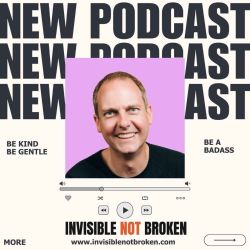
Vulnerability, Resiliency, and Advocacy with Tim Reitsma
47:06Monica Michelle is joined by consultant and podcast host Tim Reitma.Tim lives with Crohn's Disease.In this episode, Monica and Tim discuss: Tim’s resiliency through managing his Crohn’sThe importance of self-advocacy, especially in the workplace Tim’s podcast why he shares stories of those with invisible illness TIMESTAMPS00:47 - Tim's diagnosis 06:31 - How and why Tim applies self advocacy15:41 - Why Tim started his podcast22:42 - Invisible condition etiquette31:00 - What HR can do better for employees with invisible illness39:31 - Tools Tim uses to care for his Crohn’s outside the homeThe full transcript and all links mentioned can be found on the episode page on invisiblenotbroken.com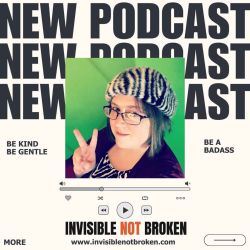
Tech and Disability: What VR Offers the Disabled Community with Sunny Ammerman
01:10:27Monica Michelle is joined by artist and disability advocate Sunny AmmermanSunny lives with Septo-optic dysplasia, panhypopituitarism, Optic Nerve Hypoplasia, and is missing a membrane in the brain called the "septum pellucidum".In this episode, Monica and Sunny discuss: Sunny’s complex disorders and how she copes with themEverything VR provides from accessible gaming, social platforms and the potential for better online education.Various VR/AR games and their gameplay Sunny’s VR support groupTIMESTAMPS00:45 - What VR/AR offers for chronically ill and disabled folks11:57 - Sunny’s conditions and how she copes with them17:55 - Features that make VR games accessible or inaccessible as well as different games and their play experiences37:13 - The social aspects of virtual gaming51:32 - What opportunities VR has for the future1:04:49 - Sunny’s VR support group The full transcript and all links mentioned can be found on the episode page on invisiblenotbroken.com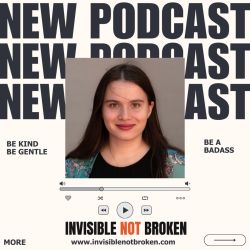
Reporting on Chronic Illness and Disability with Journalist Julia Metraux
39:16Monica Michelle is joined by Journalist Julia Metraux.Julia lives with vasculitis, mild to moderate hearing loss, and has experienced long COVID.In this episode, Monica and Julia discuss: Julia's diagnosis with vasculitis and how it influences her journalistic lensHow community impacts the mental health of those with chronic illnessHow Julia and Monica find positives and negatives in the internet spaces for chronically ill and disabled folksThe politics of how government, businesses, and celebrities influence the chronic illness community TIMESTAMPS00:32 - Julia's diagnostic journey07:02 - Julia’s work reporting on the online community of chronic illness 16:32 - The effect of Internet communities on chronically ill and disabled folks26:46 - How Julia’s illness impacts her work, both in what she writes about and how she manages her lifestyleThe full transcript and all links mentioned can be found on the episode page on invisiblenotbroken.com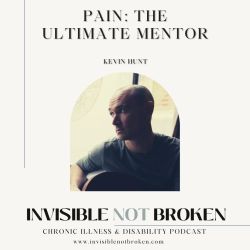
Author of “Pain: The Ultimate Mentor,” Physiotherapist Kevin Hunt
31:29Monica Michelle is joined by author & physiotherapist Kevin Hunt.Kevin lives with chronic pain.In this episode, Monica and Kevin discuss: Kevin’s philosophy of pain management as a physiotherapist who experiences chronic pain. The Hexagon Model, a life-management tool for focusing on what’s important to you.Kevin’s idea behind his new book.Using pain as a guide.TIMESTAMPS00:34 - Kevin’s work as a physiotherapist specializing in the experience of pain 06:44 - The Hexagon Model for managing your life’s needs14:00 - Putting aside the idea of a “quick fix”19:45 - Kevin’s personal experience with pain and how he uses it with patients28:44 - Kevin’s book, “Pain: The Ultimate Mentor”The full transcript and all links mentioned can be found on the episode page on invisiblenotbroken.com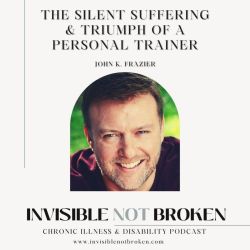
Author of “Through the Pain: The Silent Suffering & Triumph of a Personal Trainer”: John K. Frazier
28:35Monica Michelle is joined by author & personal trainer John K. Frazier.John lives with ankylosing spondylitis.In this episode, Monica and John discuss: John’s work as a physical trainer and authorChronic pain comparisonsPersonal triumphTIMESTAMPS00:50 - John’s business & diagnosis07:19 - Chronic pain olympics09:31 - Talking about & hiding a diagnosis15:09 - Personal triumph18:24 - Staying in the present23:29 - The superman complexThe full transcript and all links mentioned can be found on the episode page on invisiblenotbroken.com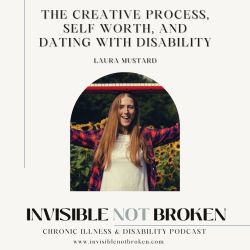
The Creative Process, Self Worth, and Dating with Disability: Laura Mustard
31:08Monica Michelle is joined by musician Laura Mustard.Laura lives with VATER syndrome.In this episode, Monica and Laura discuss: Laura’s inspiration for her upcoming musical EP.How Laura’s illness impacted her recent relationship & self-image.Laura’s creative process, new music, and social media pressure.TIMESTAMPS00:30 - Laura’s new EP / Monica’s recent COVID experience05:32 - Relationships with chronic illness11:20 - Image and self acceptance with disability15:32 - Laura’s creative process and current projects20:05 - Pursuing creativity despite social media attentionThe full transcript and all links mentioned can be found on the episode page on invisiblenotbroken.com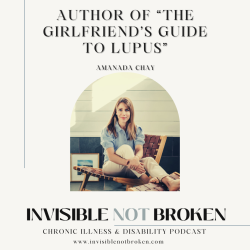
Author of “The Girlfriend’s Guide to Lupus”: Amanda Chay
30:43Monica Michelle is joined by author Amanda Chay.Amanda lives with Sjögren’s and Lupus.In this episode, Monica and Amanda discuss: Amanda’s book & diagnosisOutlooking on work & writingNavigating chronic illness with kids & familyTIMESTAMPS00:26 - Intro + The Girlfriend’s Guide to Lupus02:17 - Amanda’s diagnosis10:09 - Amanda’s outlook on writing17:11 - Navigating chronic illness with kids & family23:29 - Labels and roles26:24 - Flare reads & closing remarksThe full transcript and all links mentioned can be found on the episode page on invisiblenotbroken.com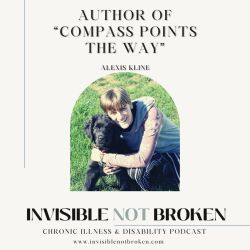
Author of “Compass Points the Way”: Alexis Kline
23:14Monica Michelle is joined by author Alexis Kline.Alexis lives with Dysautonomia.In this episode, Monica and Alexis discuss: Being a sick teenagerHaving an isolated diagnosisProductivity workflowsTIMESTAMPS00:28 - Alexis’s diagnosis & dog07:18 - Sick teenager road map10:00 - Alexis’s book & workflow16:25 - Having an isolated diagnosis20:50 - Wildlife photography, purchases The full transcript and all links mentioned can be found on the episode page on invisiblenotbroken.com
Author of “From the Sidelines to the Finish Line”: Emily Falcon
36:47Monica Michelle is joined by author Emily Falcon.Emily lives with ALCAPA.In this episode, Monica and Emily discuss: Growing up sickPost-surgery supportHaving a public bodySelf-motivation and adventuringTIMESTAMPS00:28 - Being a sick kid & Emily’s book title07:28 - Mortality10:16 - Portrayal of disability in media12:21 - Post-surgery support19:23 - Having a public body23:43 - Self-motivation29:46 - Emily’s tips for adventuresThe full transcript and all links mentioned can be found on the episode page on invisiblenotbroken.com